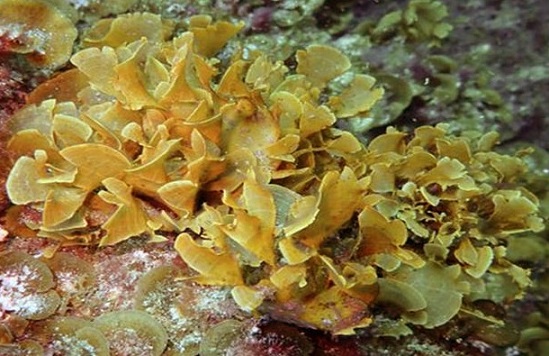Nikhil Prasad Fact checked by:Thailand Medical News Team Jan 03, 2025 3 months, 1 week, 2 days, 18 hours, 54 minutes ago
Medical News: Scientists from the Universidade Federal do Rio de Janeiro (UFRJ) have unveiled the potent antiviral properties of compounds derived from the brown marine alga Stypopodium zonale. Their study, conducted by Gabriella Mendes and colleagues, sheds light on the antiviral effects of meroditerpenoids a class of naturally occurring phytochemical compounds - against human metapneumovirus (HMPV). HMPV is a common cause of respiratory illnesses worldwide, particularly affecting children, the elderly, and immunocompromised individuals.
 Phytochemicals From Marine Algae Offer Hope in Combating HMPV Infections
Phytochemicals From Marine Algae Offer Hope in Combating HMPV Infections
This
Medical News report delves into the details of the research, which evaluated the potential of three specific compounds: atomaric acid, epitaondiol, and a methyl ester derivative of atomaric acid. The findings highlight the promise of marine-derived compounds in antiviral therapy, presenting new possibilities for treatment strategies.
The Study’s Objectives and Methods
The researchers aimed to investigate the antiviral activity of the crude extract of Stypopodium zonale and its derived compounds against HMPV. Using advanced techniques, including real-time PCR, they assessed the compounds' ability to inhibit viral replication in vitro. Cytotoxicity assays were performed to ensure the compounds were safe at concentrations effective against the virus.
The compounds were tested for their ability to inhibit various stages of the viral life cycle. The study employed LLC-MK2 cell lines, which are commonly used for virology research, and HMPV samples provided by ViroNovative BV, Netherlands.
Key Findings
The study revealed remarkable results. The crude extract of Stypopodium zonale exhibited significant antiviral activity, with a 97.7% inhibition of HMPV replication. Among the isolated compounds, epitaondiol emerged as the most effective, achieving over 99.99% inhibition. The methyl ester derivative of atomaric acid also demonstrated exceptional activity, matching epitaondiol’s inhibition rates. Atomaric acid, while slightly less effective, still achieved a substantial inhibition rate of 99.4%.
Importantly, the compounds displayed dose-dependent activity, meaning their effectiveness increased with higher concentrations. The selectivity index (SI), which measures the balance between antiviral efficacy and cytotoxicity, further underscored their therapeutic potential. Epitaondiol and the methyl ester derivative exhibited SIs of 49.26 and 12.82, respectively, indicating a favorable safety profile relative to their antiviral capabilities.
The study also investigated the mechanisms of action for these compounds. The crude extract and atomaric acid were primarily virucidal, interacting with viral particles to prevent infection. Epitaondiol demonstrated a unique ability to inhibit the virus during the penetration stage, blocking its entry into cells.
Significance of the Findings
The findings underscore th
e untapped potential of marine organisms as sources of novel antiviral agents. Meroditerpenoids, with their diverse molecular structures and potent biological activities, represent a promising class of compounds for therapeutic development. This research also highlights the importance of bio-guided assays in identifying effective antiviral agents.
Moreover, the study’s demonstration of dose-dependent activity and favorable selectivity indices for these compounds positions them as strong candidates for further development. The identification of epitaondiol’s unique mechanism of action adds another layer of interest, suggesting potential avenues for targeted antiviral therapies.
Conclusions
The study conducted by Mendes and her team represents a significant step forward in the search for effective antiviral therapies. The demonstrated efficacy of Stypopodium zonale extracts and its compounds against HMPV highlights their potential as natural antiviral agents. While further studies are necessary to explore their application in clinical settings, the research lays a strong foundation for future investigations.
These findings also emphasize the broader potential of marine biodiversity in drug discovery. As marine ecosystems face increasing threats, the urgency to explore and preserve their unique resources becomes ever more critical. Harnessing the therapeutic potential of marine-derived compounds could yield groundbreaking advancements in medicine.
The study findings were published in the peer-reviewed journal: Molecules.
https://www.mdpi.com/1420-3049/16/10/8437
For the latest HMPV news, keep on logging to Thailand
Medical News.
Read Also:
https://www.thailandmedical.news/news/the-phytochemical-gamma-fagarine-from-the-root-of-zanthoxylum-bungeanum-is-an-effective-antiviral-against-hmpv
https://www.thailandmedical.news/news/columbia-university-study-finds-that-the-phytochemical-ginkgolic-acid-can-inhibit-human-metapneumovirus-infectivity
https://www.thailandmedical.news/news/probenecid-shows-promise-against-respiratory-virus-human-metapneumovirus-hmpv
https://www.thailandmedical.news/articles/hmpv-human-metapneumovirus
